Bahçeşehir – Bahcesehir University (BAU) actively collaborates with non-governmental organizations (NGOs) at local, national, and international levels to advance the United Nations Sustainable Development Goals (SDGs).
The university works with NGOs through student volunteering initiatives, joint research programs, and the development of educational resources aimed at raising awareness, building capacity, and driving sustainable solutions.
The following section presents examples of initiatives that Bahcesehir University has continued from previous years and newly implemented during the 2023–2024 academic period, in collaboration with non-governmental organizations (NGOs).
1.Bahcesehir University- and the Association of Real Estate Investors (GYODER): “Construction Sector and Labor Dynamics in Turkey – 2024” Research Report
The image below shows a screenshot from the official website of GYODER displaying the report ‘Construction Sector and Labor Force Dynamics: Türkiye’24’ developed in collaboration with Bahcesehir University.

As one of Turkey’s most vital economic sectors, the construction industry plays a crucial role in driving growth, employment, and innovation. Recognizing this strategic significance, Bahcesehir – Bahçeşehir University (BAU), through its Center for Economic and Social Research (BETAM), collaborated with the Association of Real Estate Investors (GYODER)—one of Turkey’s leading non-governmental organizations in the real estate and construction sectors—to conduct a comprehensive research project titled “Construction Sector and Labor Dynamics: Turkey 2024” (İnşaat Sektörü ve İş Gücü Dinamikleri: Turkey 2024).
The study provides a detailed analysis of Turkey’s construction industry, focusing on its workforce structure, productivity, employment dynamics, and the transformative effects of digitalization. Drawing on comparative international data and field-based insights, the research evaluates challenges and opportunities related to sustainable labor practices, vocational skills development, and inclusive employment.
The report emphasizes the importance of enhancing workforce quality, supporting gender equality, and ensuring decent work conditions across the sector. By offering data-driven policy recommendations, the study contributes to the development of informed strategies for sustainable economic growth.
This collaboration between Bahcesehir University and GYODER stands as a strong example of how universities and NGOs can jointly advance research aligned with the Sustainable Development Goals (SDGs), particularly SDG 5 (Gender Equality) and SDG 8 (Decent Work and Economic Growth), through evidence-based approaches that inform both policy and practice.
The images below show the cover page and table of contents of the report ‘Construction Sector and Labor Force Dynamics: Türkiye’24,’ prepared through a collaboration between Bahcesehir University and GYODER, presenting national research on labor dynamics and sustainable industry development.
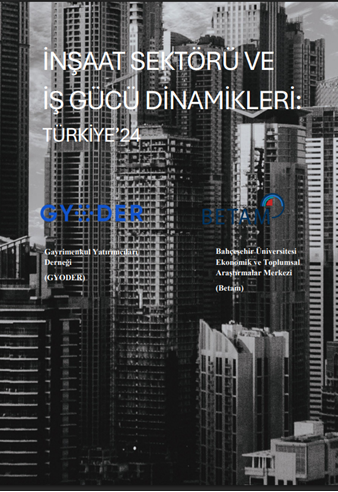
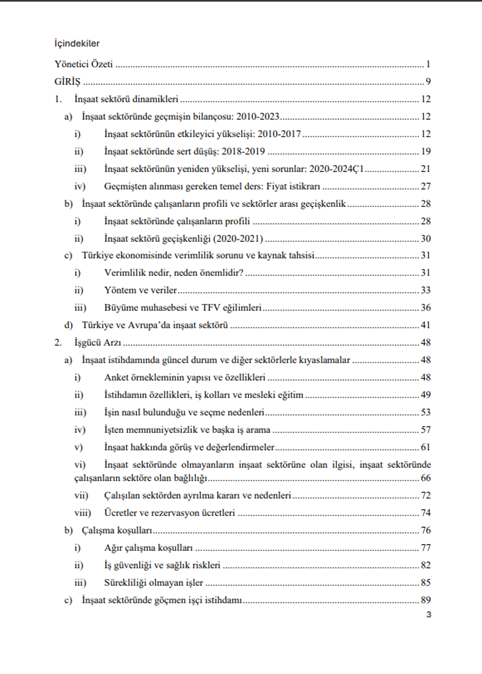
2-Bahcesehir Universtiy Policy Forum and Outcome Report on Artificial Intelligence and Technology in Hazelnut Agriculture with NGOs(2024)
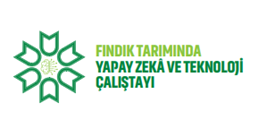

Bahcesehir University – Bahçeşehir University (BAU) actively contributed to the Policy Forum and Workshop on Artificial Intelligence and Technology Use in Hazelnut Agriculture, a national multi-stakeholder initiative jointly coordinated by the Ministry of Agriculture and Forestry, the Eastern Black Sea Development Agency (DOKA), and other public institutions, universities, NGOs, and private-sector partners.
Held in Giresun, the forum focused on developing a national policy roadmap for integrating artificial intelligence (AI) and digital technologies into Turkey’s hazelnut production systems — a strategic agricultural sector with significant economic impact. The event featured broad participation from civil society organizations, agricultural cooperatives, academic experts, and technology specialists, emphasizing the importance of inclusive and data-driven approaches in sustainable agriculture.
A key outcome of the initiative was the publication of the “Outcome Report of the Workshop on Artificial Intelligence and Technology in Hazelnut Agriculture”, which consolidated stakeholder discussions, identified national priorities, and proposed actionable policy recommendations for enhancing technological adaptation, workforce training, and environmental sustainability in the agricultural sector.
Through its participation and scientific expertise, BAU strengthened evidence-based policymaking and civil dialogue mechanisms in alignment with the Sustainable Development Goals (SDGs) — particularly SDG 2 (Zero Hunger), SDG 9 (Industry, Innovation and Infrastructure), and SDG 13 (Climate Action) — contributing to more resilient and technology-enabled food systems.
The image below shows a page from the outcome report of the workshop ‘Defining the Roadmap for the Use of Artificial Intelligence and Technology in Hazelnut Farming,’ which was conducted with contributions from Bahcesehir University and other academic, governmental, and industry stakeholders to advance sustainable and technology-driven agriculture.
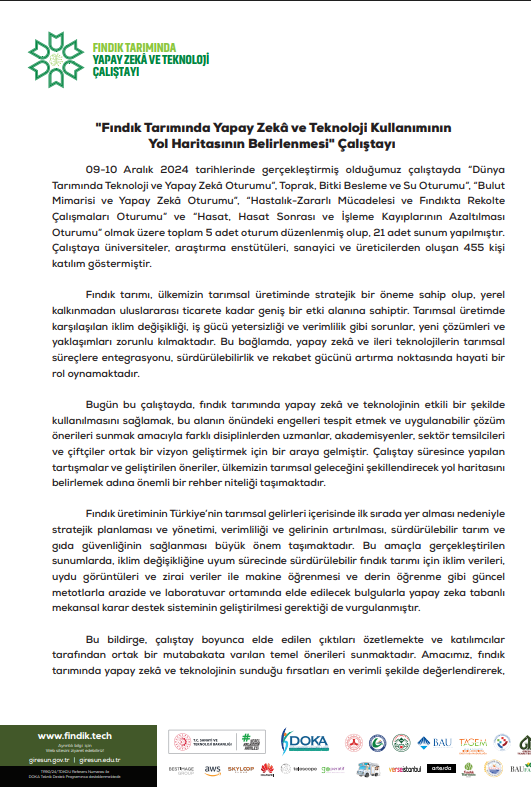
3.Student Volunteering Programs
Bahcesehir – Bahçeşehir University (BAU) actively supports initiatives that advance the United Nations Sustainable Development Goals (SDGs) through student volunteering programs carried out in collaboration with a range of non-governmental organizations (NGOs).
During the reporting academic year, Bahcesehir University strengthened its community engagement efforts by partnering with leading NGOs such as the TEMA Foundation, Rotary, the Cancer-Free Life Association, and the SEY Foundation. These collaborations enabled students to participate in meaningful volunteer work focused on environmental protection, social inclusion, public health awareness, and educational equity, fostering both civic responsibility and sustainable impact.
Bahcesehir University Young TEMA Club Students Nature and Water Awareness Workshop (01.11.2024)
The details and images below show various volunteer and community engagement activities conducted by Bahcesehir University students through different student clubs, demonstrating the university’s commitment to social responsibility and sustainability.
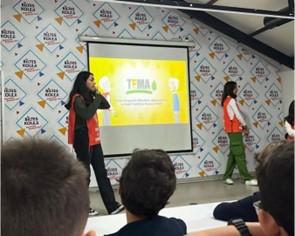
Raising early awareness for a sustainable future, Bahcesehir University Young TEMA, the environmental student club of Bahçeşehir University, delivered the “Nature and Water Awareness Workshop” at Biltes College, Istanbul, on 1 November 2024. The session aimed to introduce young learners to the fundamental values of environmental responsibility, sustainable living, and the mission of TEMA Foundation, to which the club is proudly affiliated.
Throughout the session, the BAU Genç TEMA members emphasized the interconnectedness of soil, nature, and water, helping students understand how these elements sustain life and how protecting them ensures the continuity of clean water resources. By sharing interactive examples and stories, they cultivated a sense of personal responsibility and encouraged participants to see themselves as future guardians of natural ecosystems.
Bahcesehir University Bi’Soluk Student Club: Monthly Solidarity Activities with “Çorbada Tuzun Olsun” Association
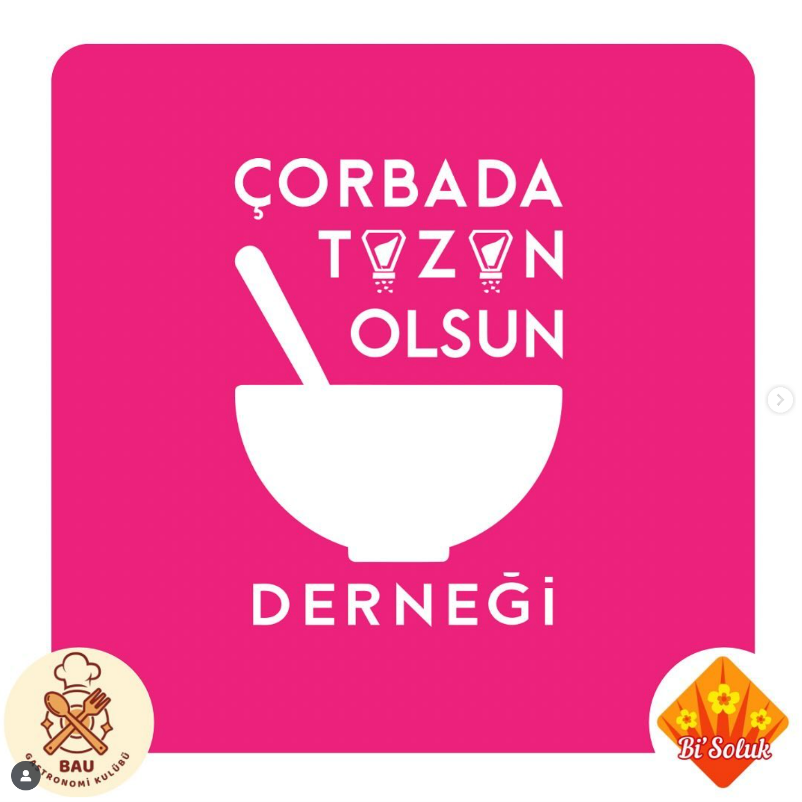
Bahcesehir University Bi’Soluk Student Club, in collaboration with the BAU Gastronomy Club and the “Çorbada Tuzun Olsun” Association, continues its regular monthly social responsibility activities throughout the 2024 academic year. These volunteer-based efforts aim to support individuals facing poverty and homelessness, foster empathy, and strengthen community solidarity among students.
As part of these initiatives, students actively participate in the preparation and distribution of hot meals and soup to individuals in need across Istanbul, providing not only nourishment but also a sense of dignity and connection. Through this collaboration, Bahçeşehir University reinforces its commitment to social responsibility, volunteerism, and the promotion of inclusive communities in line with SDG 1 (No Poverty), SDG 2 (Zero Hunger), and SDG 10 (Reduced Inequalities).
Reimagining Waste: Bahcessehir Universtiy Young TEMA Student Club Recycling Workshop
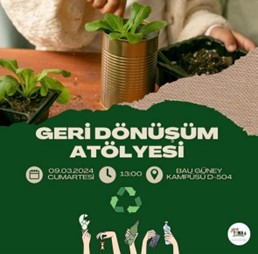
On 9 March 2024, members of the Bahçeşehir University Young TEMA Student Club organized a Recycling Workshop. During the session, students repurposed everyday materials such as plastic bottles, cans, and paper into useful new items, discovering the creative potential of recycling in everyday life.
The workshop encouraged participants to rethink consumption habits and recognize how small, individual actions can collectively support environmental sustainability. By promoting resource efficiency and waste reduction, the activity directly contributes to SDG 12 (Responsible Consumption and Production) and SDG 13 (Climate Action).
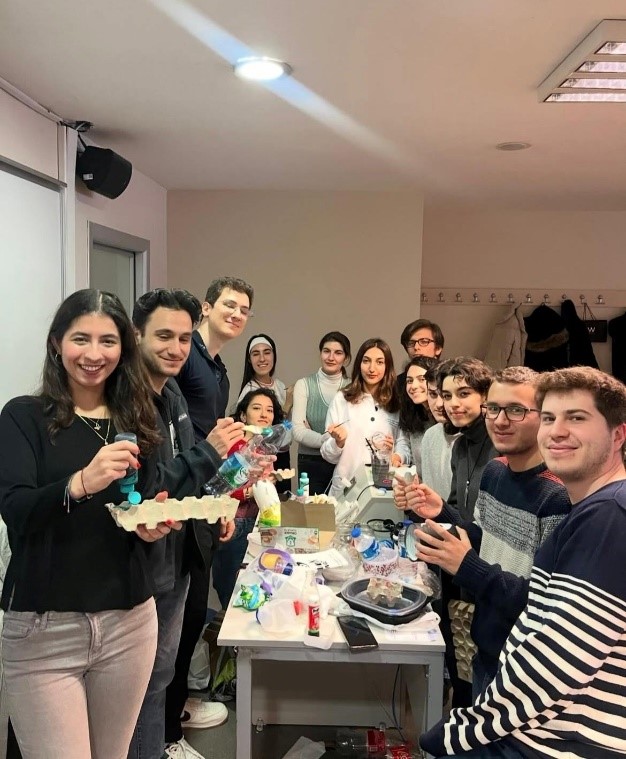
Growing Roots for the Future: BAU Young TEMA Club Tree Planting Event
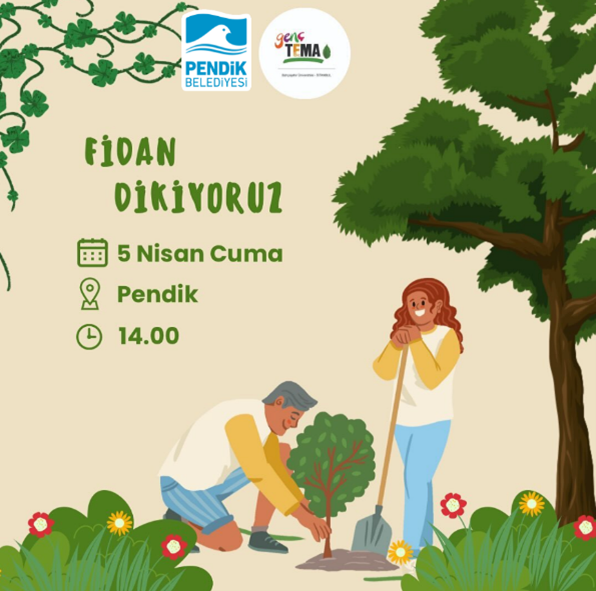
On 5 April 2024, the Bahçeşehir University Young TEMA Student Club, in collaboration with TEMA Foundations and Pendik Municipality, organized a Tree Planting Sampling Event to promote environmental responsibility and hands-on learning in ecological restoration. Students actively participated in planting saplings, gaining practical knowledge about tree planting techniques, soil care, and the long-term benefits of reforestation.
The event aimed to enhance awareness of nature-based solutions that help reduce carbon emissions, restore local ecosystems, and strengthen climate resilience. By contributing to environmental regeneration, the initiative supports SDG 13 (Climate Action) and SDG 15 (Life on Land).
Social Responsibility Event – Domestic Goods Week at Lütfi Banat Primary School (13.12.2024)
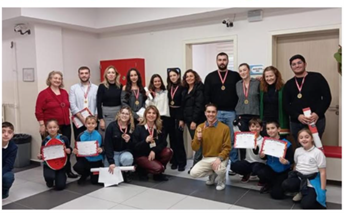
As part of Domestic Goods Week, Bahçeşehir University’s Department of Business Administration and the BAU Branding Innovation Center organized a social responsibility event at Levent Lütfi Banat Primary School with the participation of volunteer students.
The activity engaged 120 fourth-grade students in interactive workshops promoting awareness of domestic products, brand identity, and responsible consumption. Through creative brand design and shopping simulation exercises, students learned the principles of sustainability, ethical consumption, and conscious citizenship in an engaging and educational environment.
This initiative reflects BAU’s commitment to inclusive and value-driven education, directly supporting SDG 4 (Quality Education) and SDG 12 (Responsible Consumption and Production).
Dental Screening and Preventive Care for Individuals with Down Syndrome
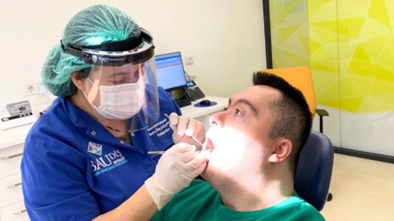
In collaboration with the Turkish Down Syndrome Association, the Bahcesehir University Faculty of Dentistry organized a community health initiative carried out with the participation of volunteer students. The project involved oral and dental screenings for individuals with special needs, providing tailored treatment plans and practical guidance on oral hygiene.
Emphasizing early diagnosis, preventive care, and regular follow-up, the initiative highlighted the importance of accessible and inclusive healthcare services. Through this volunteer-based program, Bahçeşehir University contributes to health equity and social inclusion, aligning with SDG 3 (Good Health and Well-Being) and SDG 10 (Reduced Inequalities).
Further examples of social responsibility and volunteer activities carried out by BAU students in collaboration with non-governmental organizations (NGOs) can be accessed through the following links.
4.The Hazelnut Farming: Economic, Environmental, and Geopolitical Challenges and Future Scenarios – A Collaborative Research Report by Bahçeşehir – Bahcesehir - University, the Ordu Chamber of Commerce and Industry, and OTSO Academy
The image below shows the cover page of the collaborative research report ‘Hazelnut Farming: Economic, Environmental, and Geopolitical Challenges and Future Scenarios,’ prepared by Bahcesehir University, the Ordu Chamber of Commerce and Industry, and OTSO Academy.
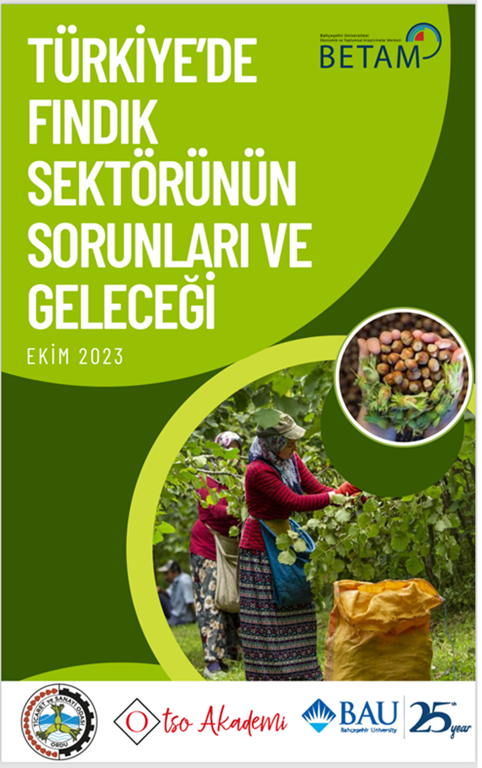
In the 2023–2024 academic year, Bahçeşehir University conducted a joint research project with the Ordu Chamber of Commerce and Industry and OTSO Academy, resulting in the publication of the report titled “The Future and Problems of the Hazelnut Sector in Turkey 2023.”
The report offers a comprehensive and data-driven analysis of Turkey’s hazelnut sector — one of the country’s most significant agricultural and export industries. It examines the economic, environmental, and geopolitical challenges affecting hazelnut production and trade, and evaluates future scenarios for ensuring sustainability and competitiveness.
While Turkey remains the world’s largest hazelnut producer and exporter, the study identifies major structural issues, including low productivity, market volatility, and price instability. It emphasizes the urgent need for technological modernization, improved agricultural practices, and strategic market reforms to secure long-term sectoral resilience.
The research further explores the influence of global demand fluctuations, climate change, and international trade dynamics on the hazelnut industry. It stresses the importance of public–private cooperation, investment in R&D, and capacity-building initiatives to strengthen local producers’ adaptation to evolving market and environmental conditions.
By presenting actionable policy recommendations, the report aims to contribute to the formulation of sustainable agricultural strategies that protect farmers’ livelihoods while reinforcing Turkey’s global leadership in hazelnut production.
Through this collaboration, Bahçeşehir University continues to bridge academic expertise with local economic development, advancing SDG 2 (Zero Hunger), SDG 8 (Decent Work and Economic Growth), and SDG 12 (Responsible Consumption and Production) by supporting sustainable and inclusive agricultural policy-making.
5.BAU– United Nations Institute for Training and Research (UNITAR) Equal Opportunity in Technology Certification Program and Online Educational Materials
The image below shows the poster of BAU– United Nations Institute for Training and Research (UNITAR) Equal Opportunity in Technology Certification Program.

Bahçeşehir University (BAU), in collaboration with CIFAL Istanbul, affiliated with the United Nations Institute for Training and Research (UNITAR), and in partnership with Yapı Kredi Bank, continues to advance its mission of promoting equality and innovation through the “Equal Opportunity in Technology Certification Program.” This initiative is designed to increase women’s participation in the fields of technology and innovation, contributing to the creation of a more inclusive and diverse digital future.
The certification program provides free, high-quality online training and educational materials, developed and delivered by Bahçeşehir University’s distinguished academic staff in cooperation with UNITAR experts. Participants engage in comprehensive learning modules covering Big Data, Artificial Intelligence, Cloud Technologies, Cybersecurity, the Internet of Things (IoT), and Industry 5.0. These training contents are designed with a focus on practical applicability and global standards, ensuring that participants gain both theoretical knowledge and industry-relevant competencies.
In 2024, the program expanded its scope to reach a broader audience. It is now open to all women aged 15 and above, with no upper age limit, allowing greater inclusivity and ensuring that women of all ages can benefit from technological education and empowerment opportunities.
The Equal Opportunity in Technology Certification Program is entirely free of charge and open to all women who wish to develop their skills and advance their careers in technology. Moreover, individuals of any gender residing in the “Hope Cities” established by Koç Holding after the Kahramanmaraş-centered earthquakes are also eligible to participate — reflecting Bahçeşehir University’s unwavering commitment to social responsibility, inclusivity, and equal access to education.
Launched in 2023, the program has already achieved remarkable impact: by the end of 2024, a total of 22,450 women have successfully completed the training and received certificates. The certification program will continue until the end of 2026, aiming to reach and empower even more women across Turkey and beyond through education, innovation, and equal opportunity.
Detailed information about the program and the application process can be accessed through the following links: